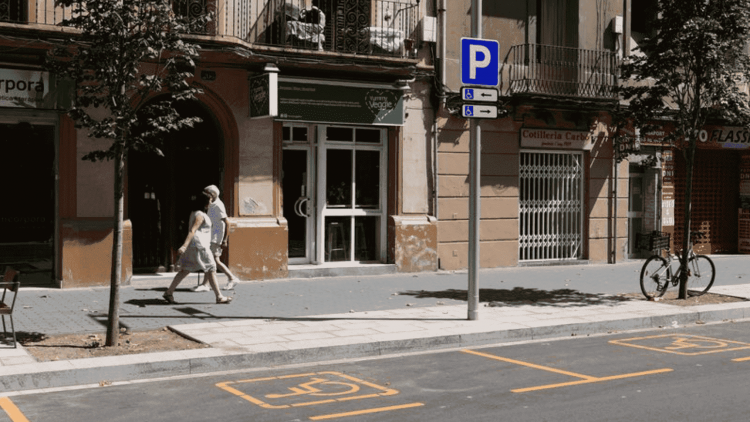Publication of invitation to tender
How can we ensure proper use of reserved parking places?
Finalist businesses
Award of contract to successful tenderer
Successful tenderer signs the contract
THE CHALLENGE
Barcelona aims to guarantee a fair distribution of public spaces, to become a more accessible and inclusive for everyone. Barcelona’s transformation towards a more sustainable, accessible and inclusive city requires a reduction in the amount of space allocated to private-use vehicles, while also ensuring sustainable alternatives for mobility.
The transition will require a more efficient parking-control system on the road to guarantee proper co-habitability in public spaces and to meet the needs of the city and its residents, especially its most vulnerable groups. That means compliance has to be guaranteed when it comes to the proper occupation of public parking places, mainly those reserved for people with reduced mobility.
The comprehensive parking-ordering system on the road (AREA) features several types of parking places in Barcelona: for people with reduced mobility, urban freight distribution, taxis, ambulances, police, official services, Bicing, residents and green and blue areas. There has been an increase in the number of reserved parking places over the last few years with the upsurge in new needs (multi-disciplinary places, shared-mobility vehicles, electric-vehicle charging points and so on).
Proper parking of vehicles in reserved places is currently verified through identification and control systems through the Guàrdia Urbana [city police] and municipal officers, who, where necessary, call on the municipal towing service for removing offending vehicles. That format creates the following difficulties:
- Legal identification of vehicles cannot be immediately corroborated and is based on period lists of vehicles.
- Given the capacity of the system and its processes, decisions on offences cannot be taken immediately.
That means Barcelona needs to identify innovative technology-based solutions that enable the immediate management and verification of vehicles as they are parked in public parking places. This solution would enable municipal towing or the penalty system to act immediately, which would reduce the number of wasted journeys and ensure compliance in the spaces’ envisaged use, according to AREA.
A system with these features would bring about the following benefits:
- Reduction in polluting emissions in the city, through optimisation of municipal-towing journeys.
- Promotion of a more accessible and inclusive public space improving and guaranteeing the availability of parking places allocated to specific uses, needs or groups.
- Drop in the number of vehicle-parking offences and promotion of civic behaviour.
- Improved efficiency in the management of public resources, as well as their supervision.
The challenge applies to the entire city of Barcelona and also to other cities.
This project will meet the following sustainable development goals (SDGs):
- 10. Reduced inequalities
- 11. Sustainable cities and communities
- 16. Peace, justice and strong institutions
-
Two million journeys by private vehicles are taken every day in Barcelona, representing a challenge in the proper use of parking spaces allocated for special needs. While the goal for 2024 is to reduce the number of private-use vehicle journeys by 25%, the proper use of parking spaces still needs to be monitored.
The city currently has 14,339 spaces reserved for PRM (people with reduced mobility), 603 for taxis, 316 for official services (Catalan government, City Council and consular corps), 635 for buses as well as 54,221 parking places (blue, green and exclusive for residents) and 86,945 allocated for other uses (urban freight distribution, motorbikes, buses etc.).
This situation is comparable to any city in the world where a number of parking spaces are allocated for specific uses, for the purposes of democratising public space and vehicle access is restricted to certain zones and use of the road is not allowed, for compliance with WHO-established pollution levels or a fairer distribution of the city or its very attractive areas. It is therefore essential to be able to check, when a vehicle is occupying a reserved parking space, whether it is authorised to do so, using a fast and practically automatic and autonomous system.
This problem is concentrated mainly in large cities and, more specifically, in every area with a higher density of use of public spaces.
-
Barcelona is looking for innovative technological or digital solutions that enable us to:
- Guarantee that public spaces are inclusive and accessible, by controlling improper uses of public parking spaces.
- Ensure the proper functioning of the comprehensive parking system on roads and greater satisfaction of its users.
- Optimise the management of public resources by improving the efficiency of the control and penalty systems.
Projects will be positively assessed that:
- Preferably do not require the installation of specific communication teams on public roads and which use already existing communication networks (for example, by making use of users’ own devices). Should any facility be required, it must be ensured that it is simple, maintained and optimally operational for a guaranteed minimum of 5 years.
- Provide for mechanisms for assessing, qualitatively and quantitatively, improvements to the occupation of public spaces, economic sustainability of the public services and index of city resident satisfaction.
- They remain both financially and technically feasible and are easily applicable to the city’s other parking spaces, as well as in other cities.


